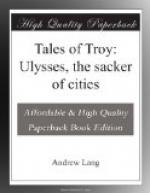Then Achilles remembered his own father, far away, who now was old and weak: and he wept, and Priam wept with him, and then Achilles raised Priam from his knees and spoke kindly to him, admiring how beautiful he still was in his old age, and Priam himself wondered at the beauty of Achilles. And Achilles thought how Priam had long been rich and happy, like his own father, Peleus, and now old age and weakness and sorrow were laid upon both of them, for Achilles knew that his own day of death was at hand, even at the doors. So Achilles bade the women make ready the body of Hector for burial, and they clothed him in a white mantle that Priam had brought, and laid him in the wain; and supper was made ready, and Priam and Achilles ate and drank together, and the women spread a bed for Priam, who would not stay long, but stole away back to Troy while Achilles was asleep.
All the women came out to meet him, and to lament for Hector. They carried the body into the house of Andromache and laid it on a bed, and the women gathered around, and each in turn sang her song over the great dead warrior. His mother bewailed him, and his wife, and Helen of the fair hands, clad in dark mourning raiment, lifted up her white arms, and said: “Hector, of all my brethren in Troy thou wert the dearest, since Paris brought me hither. Would that ere that day I had died! For this is now the twentieth year since I came, and in all these twenty years never heard I a word from thee that was bitter and unkind; others might upbraid me, thy sisters or thy mother, for thy father was good to me as if he had been my own; but then thou wouldst restrain them that spoke evil by the courtesy of thy heart and thy gentle words. Ah! woe for thee, and woe for me, whom all men shudder at, for there is now none in wide Troyland to be my friend like thee, my brother and my friend!”
So Helen lamented, but now was done all that men might do; a great pile of wood was raised, and Hector was burned, and his ashes were placed in a golden urn, in a dark chamber of stone, within a hollow hill.
HOW ULYSSES STOLE THE LUCK OF TROY
After Hector was buried, the siege went on slowly, as it had done during the first nine years of the war. The Greeks did not know at that time how to besiege a city, as we saw, by way of digging trenches and building towers, and battering the walls with machines that threw heavy stones. The Trojans had lost courage, and dared not go into the open plain, and they were waiting for the coming up of new armies of allies—the Amazons, who were girl warriors from far away, and an Eastern people called the Khita, whose king was Memnon, the son of the Bright Dawn.
Now everyone knew that, in the temple of the Goddess Pallas Athene, in Troy, was a sacred image, which fell from heaven, called the Palladium, and this very ancient image was the Luck of Troy. While it remained safe in the temple people believed that Troy could never be taken, but as it was in a guarded temple in the middle of the town, and was watched by priestesses day and night, it seemed impossible that the Greeks should ever enter the city secretly and steal the Luck away.




